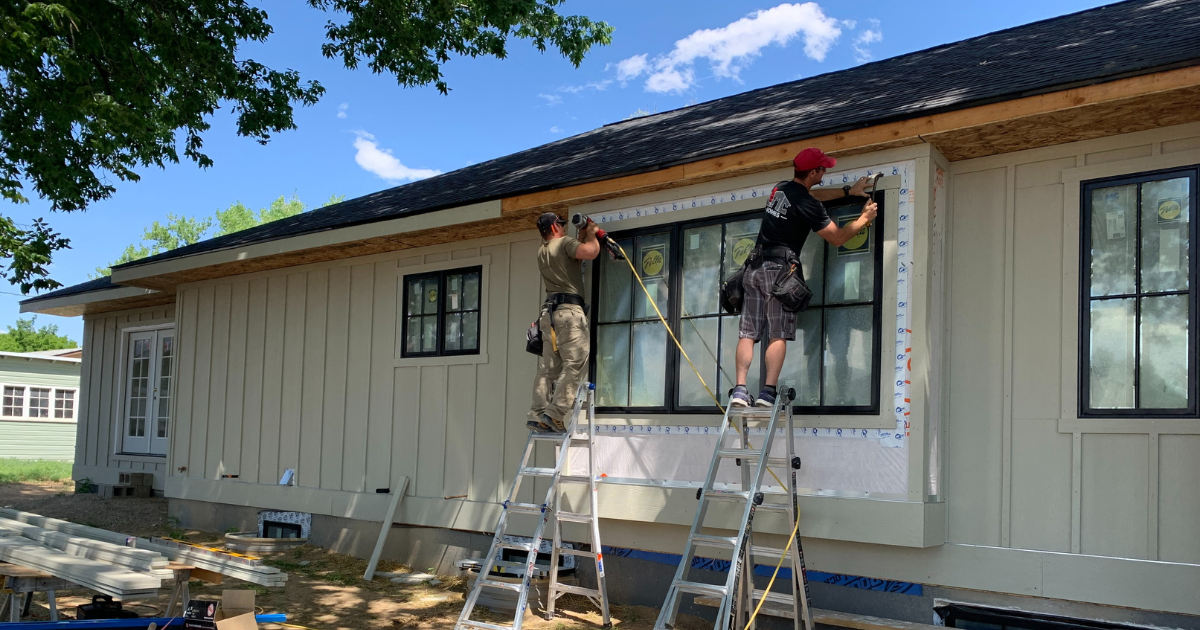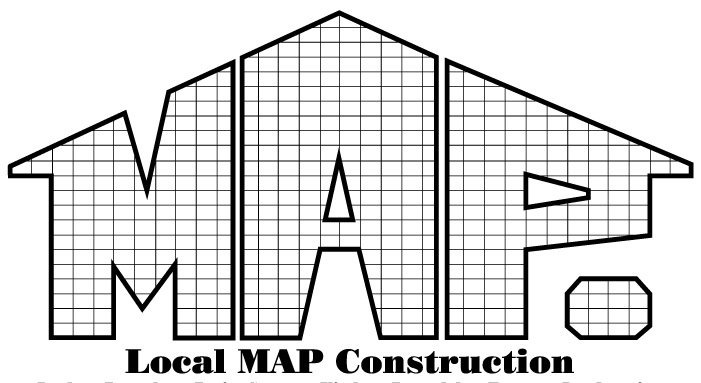General Contractor Services In Northern Colorado
We do basements, garage additions, bathroom remodels, kitchen remodels, and are located in Northern Colorado. Hire us to finish your unfinished basement! Local Map Construction is focused on quality craftsmanship and our projects are cost plus, which means you benefit from our connections. You receive our discounted costs with our suppliers and licensed contractors. Call us to get on our schedule for a free estimate.
You may be wondering what a general contractor does and what kind of help they can give to make your home a better place to reside in. They can do a home addition, basement renovations, and more. We also believe that you’re aware that these general contractors are everywhere – as a single Google search of who’s in your proximity would pop up quite a number of results. We understand that trying to get to the bottom of all this and singling out the best possible general contractor might prove quite tedious for you – that’s why we put up this guide to ensure that you get to understand this niche quickly and you get to easily figure out the best possible general contractor in your area.
What is a general contractor and what do they do?
By definition, a general contractor/main contractor/prime contractor/building contractor is a person or business entity from the construction industry that ensures the proper workflow and paperwork within a construction site and in all aspects of construction. This includes being responsible for general oversight of a site or the entire building project, management between trades and vendors (for materials and instruments needed for the project along with the building permit, code requirements, building regulations, and compensation insurance), and timely updates and communication of information between everyone involved in a given project. Sometimes, the general contractors even become the foreman and building designer when needed at the design phase be or if asked of them, much like a construction manager (that works with project management) for a construction project.

A general contractor is usually employed by a property owner or project owners (possibly from construction companies) and works hand in hand with architects and engineers of a certain project (if there is one). The bulk of the work that a general contractor deals with is mostly reliant on project-specific documents and general oversight – from site visits, submitting proposals and bidding, some necessary unrelated building trades, and making contract documents.
Most of the responsibilities expected from a general contractor include construction manager/project management work – providing construction materials, labor or workforce, construction equipment, and hiring necessary and specialized subcontractors as needed. It also goes without saying that the general contractor’s top priority on a job site or project is to ensure everyone’s safety and lower the risk of injury – from the laborers to the client or the property owner. Quality standards are also considered.
This means that these are the people in the construction industry that handles contractor licensing, the license application, the licensing requirements, and of course, the construction process. Construction contracts can also be negotiated for by general contractors, making sure building codes are met along with other precautions stated by a certain city or state’s license board when it comes to safety and health, fire safety, and economic development. From how-to guides, the lien waiver, dealing with land surveyors, surety bonding, project delivery methods, and making sure to complete the required task at hand, the contractor ensures public safety , public health, and construction safety at all times.
Of course there are an array of different contractors that are specific to a type of job or location such as plumbing contractors, prime contractors, associated general contractors, and California contractors. All these people deal with the overall duties whenever construction is done from human resources (up to creating the staff directory) , application status and making sure the license apply to the project at hand (mostly dealing with the city council), the design and construction (from creating an image library up to making sure all frequently asked questions are answered),up to dealing with other admin and safety work (making sure public health standards are met, sole proprietorships are worked out as needed along with limited liability, wastewater treatment is dealt with, etc). Sometimes even press releases tend to get assigned, with contractors dealing with a hot topic on special events, social media, or news releases. A contractor is responsible for a lot of things when having a construction project, with the lien waiver, how-to guides, and license board only being the start of the entire process.
To add, the general contractor’s responsibilities also extend to applying for building permits, securing properties, providing temporary utilities, managing personnel on the job site or project, monitoring schedules and the cash flow, maintaining accurate records, providing proper surveying and engineering of the site, and properly disposing or recycling of construction waste.
How does a general contractor get paid?
Given the extent of work they put into a project, a general contractor usually gets paid a percentage of the project’s total fee. This percentage of the wage for construction managers usually ranges from 10%-25% depending on the size of the project, the markup on materials, subcontractor labor, and the price of the project as a whole.
Payments vary per contractor – but the terms are usually ironed out before starting the job. While no one would ask for the total cost upfront, usual setups for payment include asking for a portion of the cost (downpayment) or several payments turned over as each phase or portion of the work gets completed.
Types of contractors
Right out of the bat, there are actually five different types of contractors:
General contractor – what you can expect from a general contractor is that they can provide daily supervision on construction projects – making sure everything is on schedule, the cash flow is on point, and everyone is safe within the area of construction. They’re best to call for any type of work, as they can make sure that building landmark properties would be a breeze.

Electrical contractor – the electrical contractor takes care of supplying an ample amount of energy to a certain project at hand. Usually also supplied by a general contractor or contracting company, the electrical contractors are specialty trade contractors ensure that all the electrical systems and everything that’s powered by electricity inside the project is safe, secure, and well-functioning
Trade contractor – trade contractors are like extra hands for a certain project. Also known as subcontractors, their work usually comprises what makes up the foundation of a certain construction – and this includes windows, layouts, landscape, plumbing, roofing, cladding, tiles, among other things. They may be considered as specialty trade contractors, with a proper trade-specific license necessary for the work
Design and build contractor – the design and build contractor is usually a company or firm that eliminates the need to hire an architect – as they provide it themselves and also easily move forward to having the project come to fruition. The job title is as straightforward as it can get, and an advantage in this setup is that accountability and communication are easier since it’s only coming from one team – turning the construction process into a collaborative planning process. This makes the building process a lot faster – may it be that you need a steel erection or several concrete structures up ASAP.
Freelance contractor – these self-employed general contractors are usually perfect for low-cost, small-scale projects that don’t require extensive management or intense work. These types of self-employed workers usually only work for a specified time until the project is completed – with no companies, firms, or authority holding them back from doing what they please.
Licensing Requirements
General contractors are expected to pass an International Code Council (ICC) exam to get themselves a license, and these are usually subdivided into three classes (A, B, and C). Do note that some urban areas require specific ICC local tests (beyond the typical three classes) along with the national exams to have a contractor be certified and licensed in their preferred category.

Licensing Qualifications
The qualifications of getting a general contractor license usually vary depending on what class or type you’re aiming for. The three classes/types of licenses for general contractors are of the following:
Class A – This is the license that encompasses most types of work. If you have a Class A, you can work on any project of any size and type. The only restrictions here are plumbing, electrical, mechanical, fire extinguishing, and elevators – which can easily be fixed by acquiring a trade-specific license (which offers construction specialties to a given project).
Class B – This license allows for contractors to work on most commercial construction and residential building construction aside from those designated as IA or IIA by the International Building Code. To add, they also can’t work on specific trade without the appropriate additional licenses. Most residential contractors opt for this type of licensure as it proves to be more flexible yet not too all-encompassing.
Class C – This type of license is only good for residential contractors that work on residential building construction that are only for multi-family or single-family use. These types of buildings should be only less than three stories and have less than four living units. The rule regarding trade-specific licenses also applies here.
While not particularly selective in the entire process, license applications require a certain school diploma that shows a degree in construction management. The different classes only make certain that government agencies don’t mess up building projects – especially since they are tired to make complicated projects or larger projects more exclusive to people with more construction experience.
When to hire a contractor
To know when it’s time to hire yourself a general contractor, it’s best to ask yourself the following questions:
How long does it take to finish the project?
If a project is estimated to be completed beyond a week, a general contractor may help iron things out in terms of scheduling and procurement of labor and materials.
How many different subcontractors are needed for the project?
You can definitely do it on your own if you’re only going to work with one subcontractor (as it’s easier to oversee). But if the project requires you to hire several subcontractors and check up on them all at the same time, then getting yourself a general contractor would ensure you quality work and less hassle.
How will local building codes affect the project at hand?
-Some projects (usually the big ones) require licensure for them to proceed, all in accordance with local building codes. Powering through this alone is a bad idea, especially since you’d only be stopped by authorities and be fined accordingly for your actions.
Contractor vs subcontractor
A contractor is defined as an individual or company hired to complete and oversee a project within a certain construction contract.
Subcontractors, on the other hand, are employed by contractors to carry out specific work within a contracted project. Subcontractors usually are well-equipped with trade-specific licenses, giving them specialization and expertise for specific fields and niches.
To summarize, owners/clients are the ones hiring the contractors and these contractors are the ones that hire subcontractors.
FAQ
What is the difference between a contractor and a general contractor?
A contractor is more of an umbrella term for different types of contractors – may they be trade-specific, freelance, of different types of licenses, or are subcontracting. General contractors on the other hand refer to the type of contractors that serve as a managerial element to a construction site or project, making sure everything goes according to plan and that the project proceeds smoothly and without fuss.
What is considered to be general contracting?
The scope of general contracting includes provision of material, labor, equipment, services, tools, and vehicles for a certain construction or project. General contracting gives people the responsibility to hire subcontractors as necessary, make sure the cashflow is in proper shape, make sure that the schedule is followed, and most importantly they make sure that all the paperwork is filed as necessary.
What is the difference between a contractor and an employee?
Contractors usually work within a contract – which means they aren’t as bound or tied to any company or firm. This would also mean that they aren’t to receive typical benefits an employee would, and this included thirteenth-month pay, health benefits, insurance, and the like. In fact, it’s typical to see self-employed general contractors , while it’s rare to see employees do the same.
Is having a general contractor worth it?
If you’re quite inexperienced with dealing in home renovations or construction projects, getting yourself a general contractor helps in saving you stress, time and money. Also, they make sure that everything is to a standard or a quality – and you can be confident with them on that since they definitely have been doing this as a living for quite a while now.
How much does a contractor usually cost?
There’s no definite number to it since the value can only be determined as a percentage of the project’s total cost. The general contractor’s salary/ professional fee is usually worth 10% to 25% of the total project cost – and the percentage varies depending on the compensation of the workers for their labor, general insurances and liabilities, taxes, profit, and the overhead for the staff, operations, and the office.

Hiring a general contractor
Keeping all this in mind and trying to dilute and streamline it into one idea may prove to be tricky, so here are some things you may want to keep in mind when you’re about to get yourself a general contractor.
Get some recommendations – Surprisingly, word of mouth proves helpful when spreading out positive things about people. Your friends and family would definitely have recommendations for such, but you can also always check on the National Association of the Remodeling Industry just in case you’re feeling lost.
Interview candidates over the phone – Calls easily sets expectations for clients on what they can get out of a certain contractor’s finished job. Basically, it’s a good way to get acquainted from the get-go with whomever you plan to be working with – so feel free to ask if they can take on your project if they can give proper references, share a list of previous clients, how long have they been doing their job, and if other projects would also coincide with your schedule. This easily paints a clear picture of what you’d get from working with them – letting you easily sort out viable candidates
Meet face to face once decided – Once you’ve picked out several contractors of interest, you can proceed with laying out the groundwork of the project and check if they’re willing and capable to work on it in terms that both of you would agree on
Investigate on facts – Thanks to the internet, this is easy. You can easily check out reviews of the company or contractor you’re about to work with through a quick Google search. If you’re still feeling a bit skeptical, you can also try and connect with people who have worked with these contractors and companies before just to get a picture of what it’s like to work with them
Create a plan and pick through bids – To narrow your list down further, make sure to have a blueprint ready before asking contractors for possible bids. Also, don’t be too wary in asking them for the breakdowns in their bids – with the labor, additional expenses, cost of materials, and profit margins all spread out and transparent enough for you to check. A good measure of this is that 40% usually is the total cost of the project, the typical profit margin is at 15-20%, while the rest goes to the overhead of the job or project.
Set a payment plan/schedule – When sorting this one out, it can easily become a telltale sign that something is fishy with the contractor you’re about to work with. The usual wage for construction managers for large projects would be having 10% of the bid at contract signing, three payments of 25% of the bid spread throughout different phases of the project, and the last 15% once the job has been finished and completed.
Get the lowball out of the way – You can easily tell this contractor is either desperate for work or sacrificing quality just to catch your attention by making things super cheap. Since the project they’d be handling is no simple task you can easily make amendments to once it falls short, it’s best to stick to someone who can provide you with service that you’d be confident on in the long run
Make sure to have everything in writing – it is important to always have a written document of everything you have talked about and agreed upon with the general contractor you’ve decided to proceed with – so as not to cause any problems in the future
If you’re in Northern Colorado and you’re looking for a reliable general contractor who can easily get your project done in the best, fastest, and safest way possible, you may want to call Local Map Construction at 720-635-2941 or send an email to get a response ASAP.
Access the Finding Basement Builders Near Me article to know more about basement remodeling.
